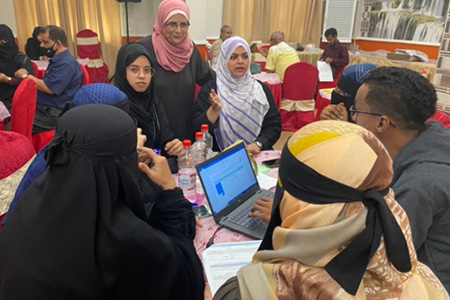 20 July 2023, Aden | Sana’a – Quality of care is critical to improve health outcomes, patient satisfaction and cost-efficiency in health service delivery. That’s why WHO and the World Bank, via the Emergency Human Capital Project (EHCP), are collaborating with health authorities in Yemen to enhance the quality of health services using a multi-pronged approach.
20 July 2023, Aden | Sana’a – Quality of care is critical to improve health outcomes, patient satisfaction and cost-efficiency in health service delivery. That’s why WHO and the World Bank, via the Emergency Human Capital Project (EHCP), are collaborating with health authorities in Yemen to enhance the quality of health services using a multi-pronged approach.
In 2022 and 2023, five workshops were conducted in Aden and Sana’a to develop a situation analysis of quality of health care in Yemen. The workshops engaged 270 key focus group members (24% female) from community, facility, district, governorate and central levels. The feedback and insights from the focus groups revealed significant gaps in planning and quality-related regulations, weak organizational structures, a lack of qualified staff, poor financing and a weak information management system. Patient safety was also highlighted as an urgent priority. Ms Fullah Al-Akshar, Quality Manager at Jeblah Hospital in Ibb, appreciated the workshops, explaining “quality of care must be a priority for all health facilities”.
The resulting situation analysis will be used as a key reference in developing Yemen’s first ever national quality of care strategy. WHO Representative to Yemen, Dr Arturo Pesigan, explained the significance of this approach: “Developing a national quality of care strategy will be a huge step forward that will serve as a crucial foundation for reaching universal health coverage and rebuilding resilience among the Yemeni people. The strategy will encompass healing, dignity and hope, paving the way for improved health services.”
In recent years, WHO has also worked with health authorities to develop national quality standards and a quality indicator tool. In 2022, WHO engaged 30 hospitals and 43 primary health care centres to self-assess how well they adhered to quality standards. The self-assessment showed that only 38% of hospitals were fully applying the standards, with 47% partially applied, and 15% not applied. At primary health care level, application was lower, with 30% fully applying standards, 41% partially and 30% not applying. Concerns raised during the self-assessment included the lack of annual plans and budgets (37%) and an absence of infection prevention and control (IPC) programmes (30%). WHO then started working with the facilities to develop and implement quality improvement plans and projects based on their self-assessment results.
 In 2022–2023, 23 hospitals experienced a transformation in quality of care, thanks to WHO support. These hospitals now have appointed dedicated quality officials and introduced training for staff in quality and IPC programmes, funded using the hospital’s own resources. In addition, some hospitals have developed and are starting to implement quality policies and procedures. Progress is regularly monitored through virtual quarterly review meetings by WHO and Yemen’s Ministry of Public Health and Population, which have helped to streamline information-sharing and reduced costs by limiting the need for resource-intensive face-to-face meetings.
In 2022–2023, 23 hospitals experienced a transformation in quality of care, thanks to WHO support. These hospitals now have appointed dedicated quality officials and introduced training for staff in quality and IPC programmes, funded using the hospital’s own resources. In addition, some hospitals have developed and are starting to implement quality policies and procedures. Progress is regularly monitored through virtual quarterly review meetings by WHO and Yemen’s Ministry of Public Health and Population, which have helped to streamline information-sharing and reduced costs by limiting the need for resource-intensive face-to-face meetings.
In the coming months, WHO will continue working on quality of care at multiple levels, including guiding implementation of quality improvement plans at the facility level and consolidating inputs from stakeholders towards drafting the first national quality of care strategy, expected to be finalized before the end of 2023. This strategy will provide a key framework for improved quality of care, leading to better health services for the Yemeni population.








